Lyumanshan Ye
ProjDevBench: Benchmarking AI Coding Agents on End-to-End Project Development
Feb 02, 2026Abstract:Recent coding agents can generate complete codebases from simple prompts, yet existing evaluations focus on issue-level bug fixing and lag behind end-to-end development. We introduce ProjDevBench, an end-to-end benchmark that provides project requirements to coding agents and evaluates the resulting repositories. Combining Online Judge (OJ) testing with LLM-assisted code review, the benchmark evaluates agents on (1) system architecture design, (2) functional correctness, and (3) iterative solution refinement. We curate 20 programming problems across 8 categories, covering both concept-oriented tasks and real-world application scenarios, and evaluate six coding agents built on different LLM backends. Our evaluation reports an overall acceptance rate of 27.38%: agents handle basic functionality and data structures but struggle with complex system design, time complexity optimization, and resource management. Our benchmark is available at https://github.com/zsworld6/projdevbench.
daVinci-Dev: Agent-native Mid-training for Software Engineering
Jan 27, 2026Abstract:Recently, the frontier of Large Language Model (LLM) capabilities has shifted from single-turn code generation to agentic software engineering-a paradigm where models autonomously navigate, edit, and test complex repositories. While post-training methods have become the de facto approach for code agents, **agentic mid-training**-mid-training (MT) on large-scale data that mirrors authentic agentic workflows-remains critically underexplored due to substantial resource requirements, despite offering a more scalable path to instilling foundational agentic behaviors than relying solely on expensive reinforcement learning. A central challenge in realizing effective agentic mid-training is the distribution mismatch between static training data and the dynamic, feedback-rich environment of real development. To address this, we present a systematic study of agentic mid-training, establishing both the data synthesis principles and training methodology for effective agent development at scale. Central to our approach is **agent-native data**-supervision comprising two complementary types of trajectories: **contextually-native trajectories** that preserve the complete information flow an agent experiences, offering broad coverage and diversity; and **environmentally-native trajectories** collected from executable repositories where observations stem from actual tool invocations and test executions, providing depth and interaction authenticity. We verify the model's agentic capabilities on `SWE-Bench Verified`. We demonstrate our superiority over the previous open software engineering mid-training recipe `Kimi-Dev` under two post-training settings with an aligned base model and agentic scaffold, while using less than half mid-training tokens (73.1B). Besides relative advantage, our best performing 32B and 72B models achieve **56.1%** and **58.5%** resolution rates, respectively, which are ...
DeepPersona: A Generative Engine for Scaling Deep Synthetic Personas
Nov 11, 2025Abstract:Simulating human profiles by instilling personas into large language models (LLMs) is rapidly transforming research in agentic behavioral simulation, LLM personalization, and human-AI alignment. However, most existing synthetic personas remain shallow and simplistic, capturing minimal attributes and failing to reflect the rich complexity and diversity of real human identities. We introduce DEEPPERSONA, a scalable generative engine for synthesizing narrative-complete synthetic personas through a two-stage, taxonomy-guided method. First, we algorithmically construct the largest-ever human-attribute taxonomy, comprising over hundreds of hierarchically organized attributes, by mining thousands of real user-ChatGPT conversations. Second, we progressively sample attributes from this taxonomy, conditionally generating coherent and realistic personas that average hundreds of structured attributes and roughly 1 MB of narrative text, two orders of magnitude deeper than prior works. Intrinsic evaluations confirm significant improvements in attribute diversity (32 percent higher coverage) and profile uniqueness (44 percent greater) compared to state-of-the-art baselines. Extrinsically, our personas enhance GPT-4.1-mini's personalized question answering accuracy by 11.6 percent on average across ten metrics and substantially narrow (by 31.7 percent) the gap between simulated LLM citizens and authentic human responses in social surveys. Our generated national citizens reduced the performance gap on the Big Five personality test by 17 percent relative to LLM-simulated citizens. DEEPPERSONA thus provides a rigorous, scalable, and privacy-free platform for high-fidelity human simulation and personalized AI research.
* 12 pages, 5 figures, accepted at LAW 2025 Workshop (NeurIPS 2025) Project page: https://deeppersona-ai.github.io/
Interaction as Intelligence Part II: Asynchronous Human-Agent Rollout for Long-Horizon Task Training
Nov 03, 2025Abstract:Large Language Model (LLM) agents have recently shown strong potential in domains such as automated coding, deep research, and graphical user interface manipulation. However, training them to succeed on long-horizon, domain-specialized tasks remains challenging. Current methods primarily fall into two categories. The first relies on dense human annotations through behavior cloning, which is prohibitively expensive for long-horizon tasks that can take days or months. The second depends on outcome-driven sampling, which often collapses due to the rarity of valid positive trajectories on domain-specialized tasks. We introduce Apollo, a sampling framework that integrates asynchronous human guidance with action-level data filtering. Instead of requiring annotators to shadow every step, Apollo allows them to intervene only when the agent drifts from a promising trajectory, by providing prior knowledge, strategic advice, etc. This lightweight design makes it possible to sustain interactions for over 30 hours and produces valuable trajectories at a lower cost. Apollo then applies supervision control to filter out sub-optimal actions and prevent error propagation. Together, these components enable reliable and effective data collection in long-horizon environments. To demonstrate the effectiveness of Apollo, we evaluate it using InnovatorBench. Our experiments show that when applied to train the GLM-4.5 model on InnovatorBench, Apollo achieves more than a 50% improvement over the untrained baseline and a 28% improvement over a variant trained without human interaction. These results highlight the critical role of human-in-the-loop sampling and the robustness of Apollo's design in handling long-horizon, domain-specialized tasks.
InnovatorBench: Evaluating Agents' Ability to Conduct Innovative LLM Research
Nov 03, 2025



Abstract:AI agents could accelerate scientific discovery by automating hypothesis formation, experiment design, coding, execution, and analysis, yet existing benchmarks probe narrow skills in simplified settings. To address this gap, we introduce InnovatorBench, a benchmark-platform pair for realistic, end-to-end assessment of agents performing Large Language Model (LLM) research. It comprises 20 tasks spanning Data Construction, Filtering, Augmentation, Loss Design, Reward Design, and Scaffold Construction, which require runnable artifacts and assessment of correctness, performance, output quality, and uncertainty. To support agent operation, we develop ResearchGym, a research environment offering rich action spaces, distributed and long-horizon execution, asynchronous monitoring, and snapshot saving. We also implement a lightweight ReAct agent that couples explicit reasoning with executable planning using frontier models such as Claude-4, GPT-5, GLM-4.5, and Kimi-K2. Our experiments demonstrate that while frontier models show promise in code-driven research tasks, they struggle with fragile algorithm-related tasks and long-horizon decision making, such as impatience, poor resource management, and overreliance on template-based reasoning. Furthermore, agents require over 11 hours to achieve their best performance on InnovatorBench, underscoring the benchmark's difficulty and showing the potential of InnovatorBench to be the next generation of code-based research benchmark.
Context Engineering 2.0: The Context of Context Engineering
Oct 30, 2025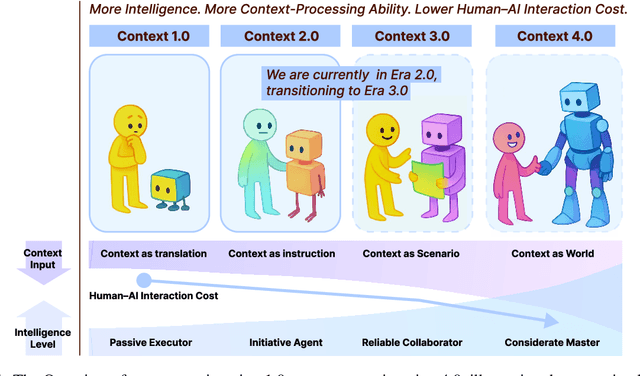
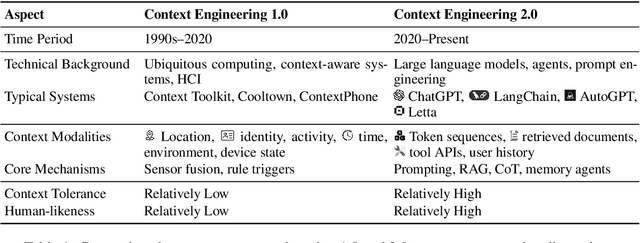
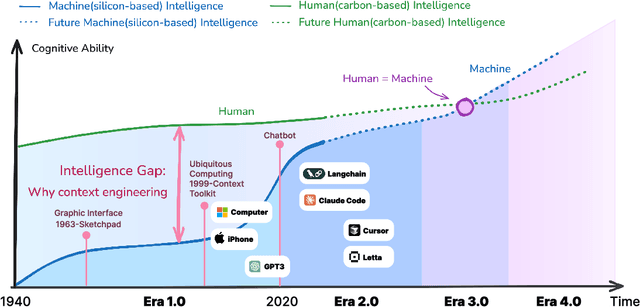
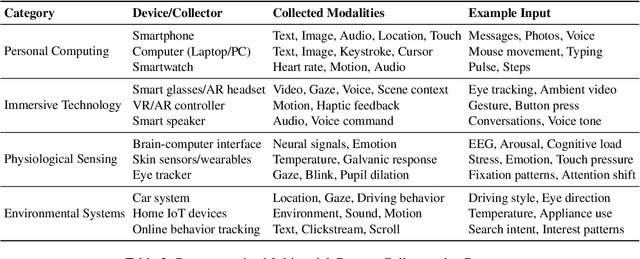
Abstract:Karl Marx once wrote that ``the human essence is the ensemble of social relations'', suggesting that individuals are not isolated entities but are fundamentally shaped by their interactions with other entities, within which contexts play a constitutive and essential role. With the advent of computers and artificial intelligence, these contexts are no longer limited to purely human--human interactions: human--machine interactions are included as well. Then a central question emerges: How can machines better understand our situations and purposes? To address this challenge, researchers have recently introduced the concept of context engineering. Although it is often regarded as a recent innovation of the agent era, we argue that related practices can be traced back more than twenty years. Since the early 1990s, the field has evolved through distinct historical phases, each shaped by the intelligence level of machines: from early human--computer interaction frameworks built around primitive computers, to today's human--agent interaction paradigms driven by intelligent agents, and potentially to human--level or superhuman intelligence in the future. In this paper, we situate context engineering, provide a systematic definition, outline its historical and conceptual landscape, and examine key design considerations for practice. By addressing these questions, we aim to offer a conceptual foundation for context engineering and sketch its promising future. This paper is a stepping stone for a broader community effort toward systematic context engineering in AI systems.
AlphaGo Moment for Model Architecture Discovery
Jul 24, 2025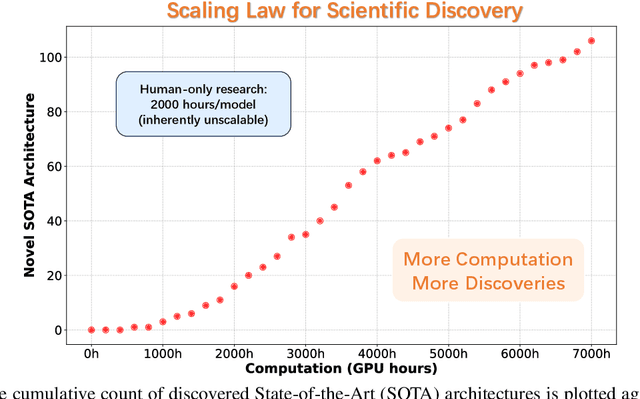

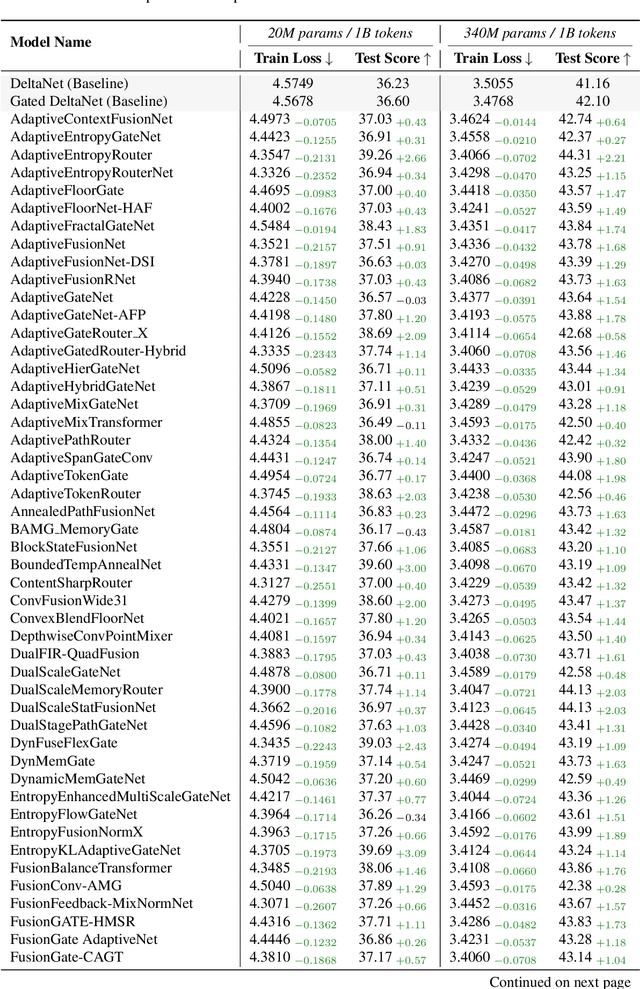
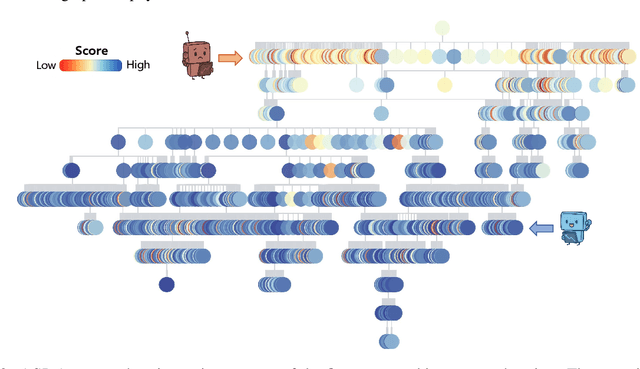
Abstract:While AI systems demonstrate exponentially improving capabilities, the pace of AI research itself remains linearly bounded by human cognitive capacity, creating an increasingly severe development bottleneck. We present ASI-Arch, the first demonstration of Artificial Superintelligence for AI research (ASI4AI) in the critical domain of neural architecture discovery--a fully autonomous system that shatters this fundamental constraint by enabling AI to conduct its own architectural innovation. Moving beyond traditional Neural Architecture Search (NAS), which is fundamentally limited to exploring human-defined spaces, we introduce a paradigm shift from automated optimization to automated innovation. ASI-Arch can conduct end-to-end scientific research in the domain of architecture discovery, autonomously hypothesizing novel architectural concepts, implementing them as executable code, training and empirically validating their performance through rigorous experimentation and past experience. ASI-Arch conducted 1,773 autonomous experiments over 20,000 GPU hours, culminating in the discovery of 106 innovative, state-of-the-art (SOTA) linear attention architectures. Like AlphaGo's Move 37 that revealed unexpected strategic insights invisible to human players, our AI-discovered architectures demonstrate emergent design principles that systematically surpass human-designed baselines and illuminate previously unknown pathways for architectural innovation. Crucially, we establish the first empirical scaling law for scientific discovery itself--demonstrating that architectural breakthroughs can be scaled computationally, transforming research progress from a human-limited to a computation-scalable process. We provide comprehensive analysis of the emergent design patterns and autonomous research capabilities that enabled these breakthroughs, establishing a blueprint for self-accelerating AI systems.
DeepResearcher: Scaling Deep Research via Reinforcement Learning in Real-world Environments
Apr 07, 2025



Abstract:Large Language Models (LLMs) equipped with web search capabilities have demonstrated impressive potential for deep research tasks. However, current approaches predominantly rely on either manually engineered prompts (prompt engineering-based) with brittle performance or reinforcement learning within controlled Retrieval-Augmented Generation (RAG) environments (RAG-based) that fail to capture the complexities of real-world interaction. In this paper, we introduce DeepResearcher, the first comprehensive framework for end-to-end training of LLM-based deep research agents through scaling reinforcement learning (RL) in real-world environments with authentic web search interactions. Unlike RAG-based approaches that assume all necessary information exists within a fixed corpus, our method trains agents to navigate the noisy, unstructured, and dynamic nature of the open web. We implement a specialized multi-agent architecture where browsing agents extract relevant information from various webpage structures and overcoming significant technical challenges. Extensive experiments on open-domain research tasks demonstrate that DeepResearcher achieves substantial improvements of up to 28.9 points over prompt engineering-based baselines and up to 7.2 points over RAG-based RL agents. Our qualitative analysis reveals emergent cognitive behaviors from end-to-end RL training, including the ability to formulate plans, cross-validate information from multiple sources, engage in self-reflection to redirect research, and maintain honesty when unable to find definitive answers. Our results highlight that end-to-end training in real-world web environments is not merely an implementation detail but a fundamental requirement for developing robust research capabilities aligned with real-world applications. We release DeepResearcher at https://github.com/GAIR-NLP/DeepResearcher.
OlympicArena: Benchmarking Multi-discipline Cognitive Reasoning for Superintelligent AI
Jun 18, 2024
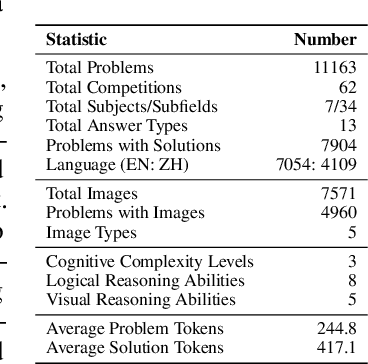
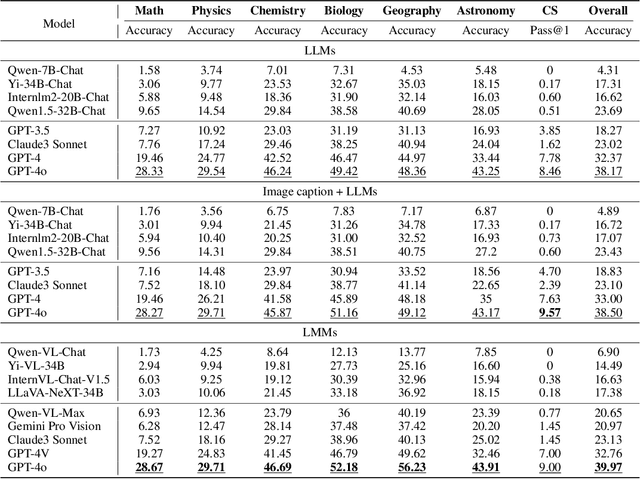
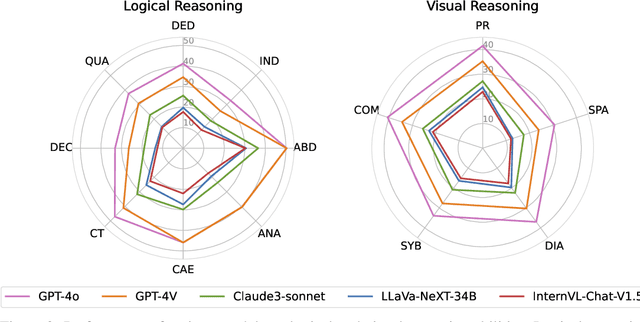
Abstract:The evolution of Artificial Intelligence (AI) has been significantly accelerated by advancements in Large Language Models (LLMs) and Large Multimodal Models (LMMs), gradually showcasing potential cognitive reasoning abilities in problem-solving and scientific discovery (i.e., AI4Science) once exclusive to human intellect. To comprehensively evaluate current models' performance in cognitive reasoning abilities, we introduce OlympicArena, which includes 11,163 bilingual problems across both text-only and interleaved text-image modalities. These challenges encompass a wide range of disciplines spanning seven fields and 62 international Olympic competitions, rigorously examined for data leakage. We argue that the challenges in Olympic competition problems are ideal for evaluating AI's cognitive reasoning due to their complexity and interdisciplinary nature, which are essential for tackling complex scientific challenges and facilitating discoveries. Beyond evaluating performance across various disciplines using answer-only criteria, we conduct detailed experiments and analyses from multiple perspectives. We delve into the models' cognitive reasoning abilities, their performance across different modalities, and their outcomes in process-level evaluations, which are vital for tasks requiring complex reasoning with lengthy solutions. Our extensive evaluations reveal that even advanced models like GPT-4o only achieve a 39.97% overall accuracy, illustrating current AI limitations in complex reasoning and multimodal integration. Through the OlympicArena, we aim to advance AI towards superintelligence, equipping it to address more complex challenges in science and beyond. We also provide a comprehensive set of resources to support AI research, including a benchmark dataset, an open-source annotation platform, a detailed evaluation tool, and a leaderboard with automatic submission features.
Patterns for Representing Knowledge Graphs to Communicate Situational Knowledge of Service Robots
Jan 26, 2021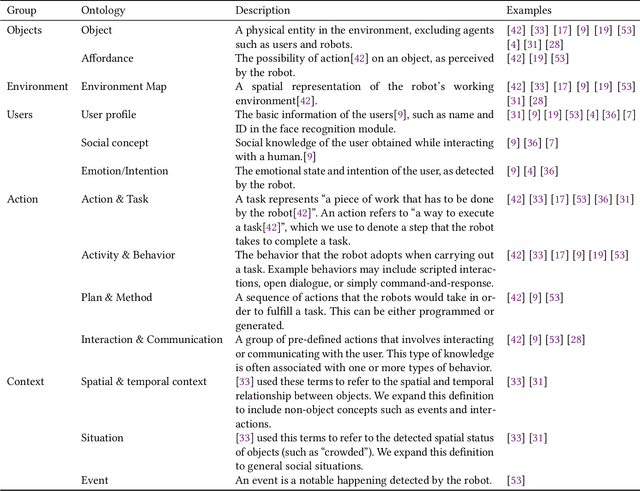

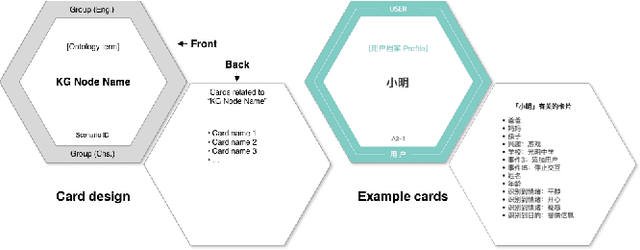
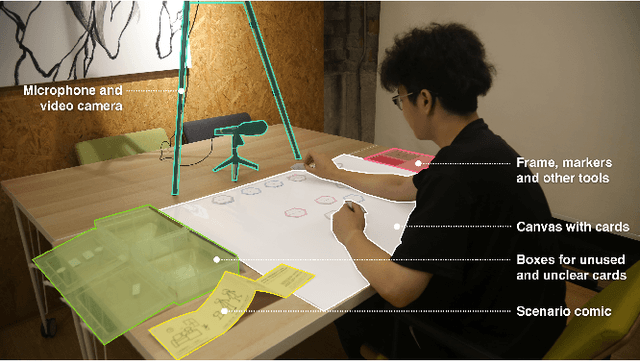
Abstract:Service robots are envisioned to be adaptive to their working environment based on situational knowledge. Recent research focused on designing visual representation of knowledge graphs for expert users. However, how to generate an understandable interface for non-expert users remains to be explored. In this paper, we use knowledge graphs (KGs) as a common ground for knowledge exchange and develop a pattern library for designing KG interfaces for non-expert users. After identifying the types of robotic situational knowledge from the literature, we present a formative study in which participants used cards to communicate the knowledge for given scenarios. We iteratively coded the results and identified patterns for representing various types of situational knowledge. To derive design recommendations for applying the patterns, we prototyped a lab service robot and conducted Wizard-of-Oz testing. The patterns and recommendations could provide useful guidance in designing knowledge-exchange interfaces for robots.
 Add to Chrome
Add to Chrome Add to Firefox
Add to Firefox Add to Edge
Add to Edge